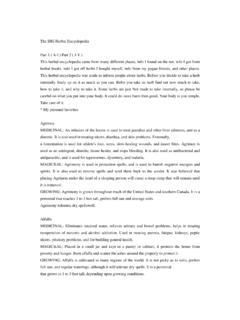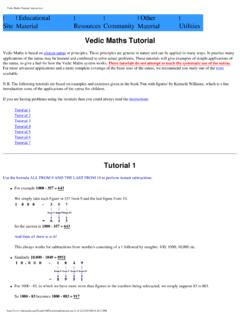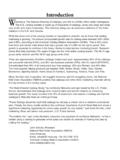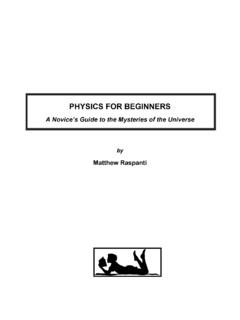Transcription of VEDIC ASTROLOGY LESSONS INDEX S.NO. LESSON …
1 Study of VEDIC ASTROLOGY demands an elementary knowledge of astronomy and some basic techniques concerned with the preparation of horoscopic charts. Understanding the static promise in a horoscope, and the dynamic aspect of timing the fruition of such promise, are areas which demand deepar study. VEDIC ASTROLOGY has at its disposal innumerable techniques which can be employed for virtually infllible results. VEDIC ASTROLOGY LESSONS INDEX LESSON DESCRIPTION 1 VEDIC ASTROLOGY an Introduction The emphasis in this LESSON is on very basic fundamentals of ASTROLOGY .
2 The vedas. Who should practise ASTROLOGY . Basic subdivisions of ASTROLOGY . 2 ASTROLOGY and Science Understanding the basic concepts of ASTROLOGY . If ASTROLOGY is a science ? Get answers to these questions, in this LESSON . 3 Elementary Concepts of Astronomy (Part-1) The introduction to astronomical concepts of ASTROLOGY . Explaining basics of ASTROLOGY , Earth, Zodiac, Sign and Nakshtras. 4 Elementary Concepts of Astronomy (Part-2) More further explanation of astronomical and astrological concepts. The geocentric astronomical framework, seasons, equator rising and setting of signs.
3 5 Elementary Concepts of Astronomy (Part-3) Sidereal time, Ayanmasa, Sayana and Nirayana system of ASTROLOGY . Planets and Zodiac. 6 Elementary Concepts of Astronomy (Part-4) The panchanga(Hindu Calendar), Lunar months, sidereal, symbolic, nodical, anomalistic, Moons cycle, Moons node and other basic cocepts related to role of moon. 7 Elementary Concepts of Astronomy (Part-5) Solar Eclipse, Lunar Eclipse. Lunar Date or Tithi system. Yoga, Karana. Astronomical features of the planets. 8 VEDIC Method of Instruction (Part-1) The signs, Horoscopic charts, The Signs or Rashis.
4 9 VEDIC Method of Instruction (Part-2) 12 Houses, Planets. 10 VEDIC Method of Instruction (Part-3) Nature of Planets, Malefics and benefics by nature, Benefics and Malefics for different lagnas, Trik Houses and their lords. LESSON 1 : VEDIC ASTROLOGY AN INTRODUCTION Aum ! May He protect us both (the teacher and the disciple) together. May he sustain us both together. May we attain vigour together. May the learning of us both be resplendent. May we harbour no mutual ill will. Aum ! Peace ! Peace ! Peace ! Peace ! Kathopanishad ASTROLOGY is as old as Vedas themselves.
5 The Vedas which are the sacred Hindu scriptures, embody eternal knowledge. Strict moral and spiritual practices along with the deep study are prerequisities to understand the essence of Vedas. To the uninitiated, the Vedas might appear as nothing more than ritualistic oblations to air, water and thunder etc. Deep truths, however begin to unfold to the true seeker as his search goes on. In time of yore, sincere seekers of truth and knowledge in India used to spend years and years at the feet of their 'gurus', learning the meaning hidden in Vedas.
6 In order to decipher what lies concealed in Vedas, a study of certain subjects is considered a prerequisite. These subjects are called the 'Vedangas' or the body organs of the Vedas. There are six such vedangas. They are : (A) Shiksha : Which deals with the understanding of the VEDIC 'Varanas', 'Swaras' and Mantras, and thus with the technique of correct pronunciation. (B) Chhanda : Dealing with the appropriate lyrical utterance of the VEDIC 'Suktas'. (C) Vyakarana : Expouding the grammatical aspects of the language. (D) Nirukta : Which explains the difficult words, 'padas' and 'mantras'.
7 (E) Kalpa : Dealing with the understanding of Sutras and the use of Mantras, hence concerned with the ritualistic aspects of the Vedas. (F) Jyotisha or ASTROLOGY : Of the body called the Vedas, ASTROLOGY represents the 'eyes' with its capacity to see the past, the present and the future. ASTROLOGY is considered as the most important of the Vedangas. What is ASTROLOGY ? ASTROLOGY is the scientific study and application of language of the heavenly bodies. These heavenly bodies determined on the basis of Astronomy and mathematics, are mapped in the form of a horoscope.
8 Their specific locations in the horoscope indicate specific happenings in the case of individuals, of multitudes and of geographical regions. Whether the Sun, the Moon, the planets and stars themselves influence the terrestrial phenomena, or they only indicate such phenomena by their various dispositions, is immaterial. What is important to us is that variations in their disposition determine variations in the events on the earth; the correlations are only too strong to be brushed aside by critics of ASTROLOGY . Who should practise ASTROLOGY ?
9 In the ancient times, a strict code of conduct was demanded of those who practised ASTROLOGY . A guru would teach ASTROLOGY only to deserving disciple who would adhere to such a code of conduct. The guru-shishya ( , the teacher-disciple) tradition is already long over in India. With changing times, it has become difficult to find an appropriate 'guru' and a deserving 'shishya' to pursue this scared study within the rules laid by the sages of yore. It is, however, quite in order to be aware of this ancient code of conduct. Varamihira, the celebrated authority on ASTROLOGY , prescribes the following qualifications for an astrologer : (a) Physical features : According to the said author , the physical feature reflect the inner nature of man.
10 The astrologer must be good to loom at, with all his body parts complete and healthy. He should be of sound health, with sound hands, feet, nails, chin teeth ears, forehead and head, and having a loud and impressive voice. (b) Moral soundness : He should be truthful, gentle, bereft of cravings and aversions, clear of heart, not inclined to be critical of the qualities of others, devoid of base and wordly distractions. (c) Behaviour in an assembly : He should be clever, able to express himself, bold in an assembly, not intimidated by his fellow astrologers, dignified and aware of the constraints of social and historical circumstances.












